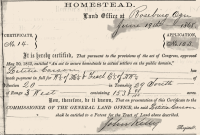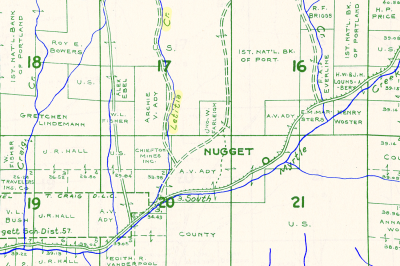By Nicole Johnson and Lily Burnett
For Black History Month this year, we take time to highlight an inspiring Oregon pioneer, Letitia Carson. She was a former slave, farmer, midwife, and the only Black woman to successfully make a land claim in Oregon under the Homestead Act of 1862.
Letitia arrived in Oregon in 1844 with her husband David Carson, an Irish immigrant (though interracial marriage was not legal at the time). When they arrived in Oregon, Letitia and David staked a 640-acre land claim in Soap Creek Valley, located in Benton County, Oregon, where they had two children and a thriving farm. After the death of her husband, Letitia sued the county twice for the rights to her property and in 1856 a federal judge and local jury awarded her $1399.75. She took the settlement and moved with her children to Douglas County, where she worked as a community midwife. When the Homestead Act of 1862 was signed into law, Letitia Carson filed a claim for 160 acres on South Myrtle Creek in Douglas County and in 1869 her claim was certified by President Grant, making her “the only black woman in Oregon to successfully secure a claim.”

On her 160-acre ranch, Letitia raised cattle and pigs and had an orchard with over 100 fruit trees. During a time in Oregon when Black people were not allowed to own land, Letitia Carson defied all odds and fought for the right to work her own piece of Oregon’s rich agricultural land.
This Black History Month we remember that Black people have been farming in Oregon since before Oregon was a state. According to the Oregon State University 2017 Agriculture census, of the 67,595 farm producers across the state today only 64 (less than .1%) are Black. This data shows that Black people are still disproportionately underrepresented in agriculture. Of the 71 Homestead Act claims certified in 1869, only 1 was granted to a Black woman (4 women total were granted claims). The inequitable and oppressive laws of the time did not allow for more people of color or women to be granted land through the Act, which directly correlates to how few people of color and women farm in Oregon today.
As a land use organization, we recognize the history of exclusive laws and practices that have created this inequality and we commit to protecting Oregon’s agricultural lands while increasing equitable access to farming for all.
To learn more about Letitia Carson’s inspiring story: click here (shorter article)
If you want to learn more about Black Oregon Pioneers (including Letitia Carson): click here (longer documentary)

